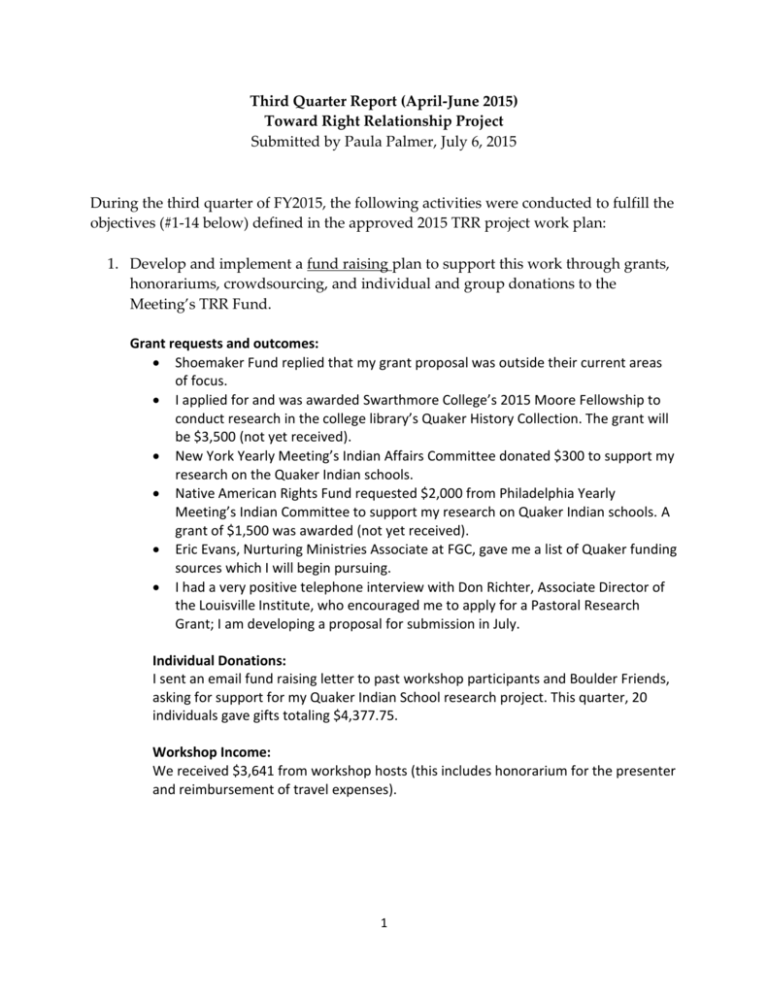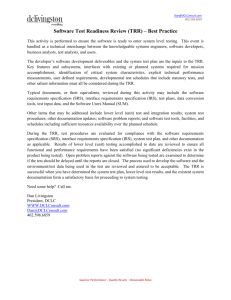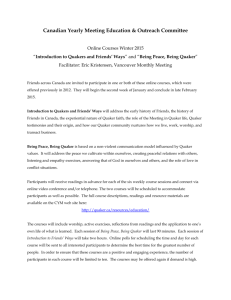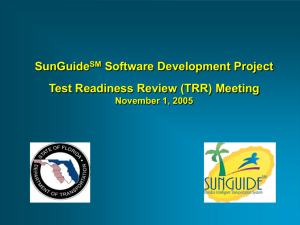April 1 – June 30, 2015 - Boulder Meeting of Friends
advertisement

Third Quarter Report (April-June 2015) Toward Right Relationship Project Submitted by Paula Palmer, July 6, 2015 During the third quarter of FY2015, the following activities were conducted to fulfill the objectives (#1-14 below) defined in the approved 2015 TRR project work plan: 1. Develop and implement a fund raising plan to support this work through grants, honorariums, crowdsourcing, and individual and group donations to the Meeting’s TRR Fund. Grant requests and outcomes: Shoemaker Fund replied that my grant proposal was outside their current areas of focus. I applied for and was awarded Swarthmore College’s 2015 Moore Fellowship to conduct research in the college library’s Quaker History Collection. The grant will be $3,500 (not yet received). New York Yearly Meeting’s Indian Affairs Committee donated $300 to support my research on the Quaker Indian schools. Native American Rights Fund requested $2,000 from Philadelphia Yearly Meeting’s Indian Committee to support my research on Quaker Indian schools. A grant of $1,500 was awarded (not yet received). Eric Evans, Nurturing Ministries Associate at FGC, gave me a list of Quaker funding sources which I will begin pursuing. I had a very positive telephone interview with Don Richter, Associate Director of the Louisville Institute, who encouraged me to apply for a Pastoral Research Grant; I am developing a proposal for submission in July. Individual Donations: I sent an email fund raising letter to past workshop participants and Boulder Friends, asking for support for my Quaker Indian School research project. This quarter, 20 individuals gave gifts totaling $4,377.75. Workshop Income: We received $3,641 from workshop hosts (this includes honorarium for the presenter and reimbursement of travel expenses). 1 2. Present the two TRR workshops -- “Roots of Injustice, Seeds of Change: Toward Right Relationship with America’s Native Peoples” (for adults), and “Re-Discovering America: Understanding Colonization”(for middle schools, high schools, and religious education programs)-- 20 times, hosted by faith communities, middle and high schools, colleges, and civic organizations around the country. During this quarter, we presented 12 adult workshops and 2 youth workshops. Five of these were presented by trained, certified TRR workshop facilitators (in Boulder, Bellingham WA, and Ithaca/Syracuse NY). 3. Provide assistance so that Native American colleagues can make at least four presentations of the TRR workshops in Native schools and communities. Jerilyn DeCoteau and Doreen Martinez presented a workshop in Kansas at the Wisdom Keepers Gathering. They had meetings with Penelope Kelsey, Director of Indigenous and Native American Studies at CU-Boulder and with Deborah Hunt, Director of American Indian Student Services at CU-Denver, and with Nancy Wadsworth, Political Science professor at University of Denver, all of whom participated in TRR workshops and are considering ways to include the workshops in their curricula. 4. Train and coach at least 10 people to present the “Roots of Injustice, Seeds of Change” workshop on their own. I trained 9 people during the Ecumenical Advocacy Days conference in Washington DC in April. Three of these signed the Facilitator Agreement document and are certified to present TRR workshops. One of the three is FCNL staff member Jose Aguto. 5. Introduce the “Re-Discovering America” workshop to 5 schools or school districts. We presented the youth workshop to Junior Young Friends at IMYM and also to Ghost Ranch’s college staff, who are considering whether to offer it as part of the Ghost Ranch summer curriculum (starting summer 2016). Jerilyn DeCoteau and I met with the Director of Education at the Boulder History Museum, who invited us to publicize and offer the youth workshop through their education programs. We will begin offering it in the fall. 6. Develop a new (Part 2) workshop to follow on “Roots of Injustice, Seeds of Change,” that will guide local groups in taking next steps toward right relationship with Native people in their communities. 2 We continue to discuss this and receive input from Native advisors, Friends, and workshop participants. Equally strong but opposing opinions are expressed about the advisability of moving workshop participants into “take action” mode vs. “sit with the pain”/reflect/let it sink in/don’t move into “fix it” mode. 7. Publish 2 articles in magazines, journals, or websites about this work The editor of Western Friend interviewed me and will publish a portion of the interview in the July-August issue. The complete interview will be available online. 8. Engage with Quaker meetings, organizations, schools, and colleges about Indigenous peoples’ concerns generally, and specifically about the Doctrine of Christian Discovery, the UN Declaration on the Rights of Indigenous Peoples, the impacts of the Indian Boarding Schools, as well as the roles Friends have played in these issues and ways that Friends can contribute to genuine healing processes. At IMYM, I presented an Interest Group called “Journey of a Leading.” I was also invited to speak about my research on the Quaker Indian schools at a session for business, and I displayed materials at the Peace and Service poster session. The IMYM webmaster created a page on their website about the TRR project and the Quaker Indian School research project. IMYM gave me a Traveling Minute. I met with Eric Evans, coordinator of FGC’s Traveling Ministries program, who expressed a desire to engage FGC in work with Native Americans. A certified TRR facilitator presented a TRR workshop at New York Yearly Meeting’s quarterly session. 9. Develop partnerships with other faith communities to carry the TRR work into wider faith community circles. Ann Cairns, TRR project’s Episcopal Church Liaison, gave two workshop presentations at Episcopal churches in New Mexico and continues to publicize the program through Episcopal circles. I gave workshops to Methodist and Unitarian congregations, both of whom expressed interest in receiving training to be able to offer the TRR workshops on their own in their denominations. I also gave workshops at a Presbyterian conference and an interfaith conference in Washington DC. 10. Continue to conduct and promote research and reflection on the role the Religious Society of Friends played in the Indian Boarding School era, and develop ways to disseminate this research and broaden the reflection. Dave Lohman and I developed and posted a new page on Boulder Meeting’s website for the Quaker Indian School research project. I began identifying the Quaker Indian day schools and boarding schools and decided to visit some of them in OK, KS, NE, IO, and IN 3 as I drive from Colorado to Philadelphia in August. I received Swarthmore College’s Moore Fellowship to conduct research in their library’s Quaker History Collection. Boulder Friend Joan Henshaw, whose relatives were teachers in a Quaker Indian school in Kansas, provided materials about her family’s history, as well as very helpful assistance in online research methods. 11. Maintain the TRR website (www.boulderfriendsmeeting.org/ipc-rightrelationship) and develop a TRR project presence on Facebook and perhaps other social media. Dave Lohman continues to update the TRR page. We created a TRR fb page and began posting relevant articles and photos. 12. Undertake new project initiatives as guided by the IPC committee, Native American advisors, Quaker organizations, and the Inner Light. At the suggestion of Doreen Martinez (Mescalero Apache), we planted Mandan Red corn on a plot on the Andrews Family Farm (Boulder Friends) in order to “grow our own” corn for use in the TRR workshops. Doreen, Rich Andrews, and I are tending the crop. 13. In consultation with Boulder Meeting and other organizations, consider whether it may be beneficial (in terms of grant funding opportunities) to move the TRR project to a different organizational home. Because I was awarded the 2015 Cadbury Scholarship and the 2015 Moore Fellowship to conduct the Quaker Indian school research during this calendar year, my focus has been to prepare for this effort and raise funds to support it. Since this is an entirely Quaker concern, it has been important to continue to house the project in the Boulder Meeting. 14. Meet monthly with the IPC committee and the Spiritual Care Committee, and quarterly with the Oversight Committee. Submit quarterly program/financial reports and post them on the TRR website. Give verbal reports to Boulder Meeting at the invitation of the clerk. These meetings have been held as scheduled, and reports have been completed in a timely fashion with the much-appreciated assistance of the Meeting’s treasurer and bookkeeper. At the clerk’s request, I gave a verbal report at the April meeting for worship with a concern for business. 4 Toward Right Relationship Project Summary Quarterly Report — FY 2015 Q3 Summary of Program Activities (Provided by Paula Palmer, Project Director) Planned Actual, Qtr #1 20 10 unspecified unspecified 11 3 4 0 7 8 4 5 Budget FY15 Actual FY15 YTD Variance 4,700 4,771 Income Individual donations Crowdsourcing Workshop host organization donations Boulder Meeting donations Grants Total Income 17,000 8,300 9,500 500 10,000 45,300 24,531 9,315 200 3,300 37,346 44% -100% -2% -60% -67% -18% Expenses Project Director Compensation Consultants Conference fees Supplies, printing, postage, other Travel Total Expenses 42,000 3,000 1,500 1,000 2,500 50,000 31,500 200 450 854 1,399 34,404 -25% -93% -70% -15% -44% -31% -4,700 2,942 Workshops delivered Facilitators trained Presentations to Quaker organizations Grant proposals submitted Qtr #2 Qtr #3 Statement of Financial Activities (provided by Toby Gallegos, Bookkeeper) Beginning Balance, 10/1/14 Net Operating Income* Fund Balance, 12/30/14 Fund Balance, 3/31/15 Fund Balance, 6/30/15 Fund Balance, 9/30/15 10,686 11,194 7,713 0 * Note: Budget planned that all funds would be expended by fiscal 2015 year-end. However, fund raising efforts are underway with a goal of achieving a $5,000 Fund Balance as of 9/30/15. 5 14 9 4 2 6






